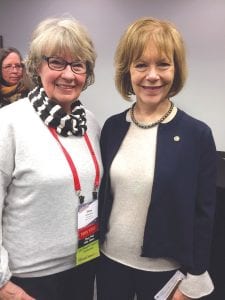Cook County Commissioner Ginny Storlie (left) met with new Minnesota U.S. Senator Tina Smith (DFL) at one of the various conferences she recently attended in St. Paul and in Washington, D.C. Storlie, who is the board chair of the commissioners, spent a week traveling about the state and D.C. lobbying for Cook County. Topics included health care, the opioid crisis, PILT, affordable housing and other items important to running a county.

Cook County commissioner board chair Ginny Storlie recently attended the National Association of Counties (NACo) Legislative Conference in Washington, D.C., where over 2,000 elected and appointed officials gathered to discuss federal policy issues that impact counties.
Held March 3-7, NACo gives county representatives a chance to have their voices heard at a national level. Storlie said, “Cook County really needs representation there. This is where we can be heard.”
Featured speakers were Wilbur Ross, Secretary of Commerce; Elaine L. Chao, U.S. Secretary of Transportation; David Shulkin, U.S. Secretary of Veterans Affairs; Cory Booker, U.S. Senator (D-N.J.); Tim Scott, U.S. senator (R-S.C.); William “Brock” Long, administrator of the Federal Emergency Management Agency; and retired Gen. Stan McChrystal, former commander of the U.S. and international forces in Afghanistan.
One of the meetings attended by Storlie was about the Payments in Lieu of Taxes (PILT) program.
With 92 percent of Cook County land either owned by the state or federal government, PILT is very important to the county, said Storlie.
According to the Department of the Interior, “PILT are federal payments to local governments that help offset losses in property taxes due to non-taxable federal lands within their boundaries.”
The original law was adopted October 20, 1976. Since that time, the PILT law has been rewritten and amended, but still recognizes the ability of local governments to collect property taxes on federally owned land.
These payments, which offset lost property tax revenue, help counties pay for essential services like law enforcement, search and rescue, firefighting, education, road maintenance and public health.
In 2017 PILT payments totaling $464.6 million were made to approximately
1,900 local governments. Since 1977 the Department of Interior has distributed more than $8 billion in PILT payments to states except for Rhode Island, the District of Columbia, Puerto Rico, Guam, and the Virgin Islands.
“This year Cook County will receive $56,000 in PILT funds,” Storlie said, adding that the writer of the first PILT bill was in attendance at the meeting she attended and he said to the attendees, “This isn’t (money) a gift. This isn’t welfare. It’s owed to the counties.”
What counties are seeking is a promise from Congress to support mandatory full funding of the PILT program. The worry is that the program will fall back to the pre-2008 funding levels where it was considered a discretionary program, subject to the whims of the appropriations process.
Storlie also attended a budget meeting where discussions were held about the housing crisis (low-cost housing) and the opioid crisis. At one session she learned that the Medicaid bill was tacked onto the farm bill this year.
“Oh well. That was interesting,” she said.


Loading Comments